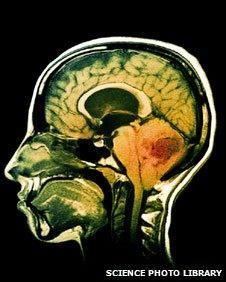Early brain cancer diagnosis hopes pinned on blood test
- Published

Cancer Research UK said more than 9,000 people were diagnosed with a brain tumour in 2010 in the UK
Researchers at the University of Central Lancashire (UCLan) believe they have found a way to cut the time it takes to diagnose brain tumours.
Patients currently require intrusive surgery for tissue sample testing.
Scientists in Preston say they have now developed a way to detect a tumour by analysing blood, cutting diagnosis from weeks to under an hour, it is hoped.
Dr Matt Baker said the test could help relieve "emotional stress patients experience waiting for test results".
Regular health screening
He said: "Statistics have shown us that more children and adults under 40 die of a brain tumour than from any other cancer and despite this brain tumours receive less than 1% of the national spend on cancer research.
"We are committed to providing reliable diagnostic tests to enable earlier detection of cancer."
Dr Baker found molecular differences when infrared light was transmitted directly at gliomas - an aggressive type of brain tumour.
The light detected molecular vibration from the blood serum, which it is hoped will eventually be used to identify different disease states i.e. cancer or non-cancer.
It is hoped in the future the test could be carried out by a doctor as part of a regular health screening.
Jay Lynchehaun, a 27-year-old brain cancer patient, from Great Harwood, said it would be "unbelievable" to be diagnosed so quickly.
"From my first symptom to surgery took ten months," he said. "If I had been diagnosed more quickly, there is a possibility it wouldn't be as serious as it is."
Cancer Research UK said over 9,000 people were diagnosed with a brain tumour in 2010 in the UK.
- Published4 November 2013
- Published22 October 2013